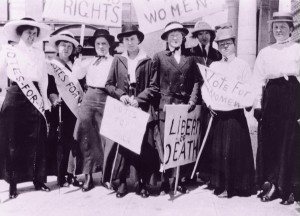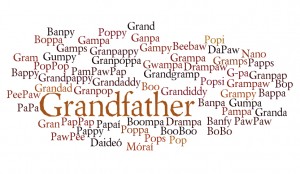From Ecclesiastes:
There is a vanity that takes place on earth, that there are righteous people who are treated according to the conduct of the wicked, and there are wicked people who are treated according to the conduct of the righteous. I said that this also is vanity. So I commend enjoyment, for there is nothing better for people under the sun than to eat, and drink, and enjoy themselves, for this will go with them in their toil through the days of life that God gives them under the sun.
(From the Daily Office Lectionary – Ecclesiastes 8:14-15 (NRSV) – June 10, 2014)
 My stepfather was a good man with faults. That is probably a description that could apply to millions of people, probably most people — good with faults. Whether he would be classed by Qoheleth as “righteous” or as “wicked” — or perhaps somewhere in between — I have no idea. What I do know is that he enjoyed himself.
My stepfather was a good man with faults. That is probably a description that could apply to millions of people, probably most people — good with faults. Whether he would be classed by Qoheleth as “righteous” or as “wicked” — or perhaps somewhere in between — I have no idea. What I do know is that he enjoyed himself.
Most of my life as his stepson he worked as a tool-and-die man. In later life, he and a neighbor together invented an emergency chlorine gas shut-off system for municipal water chlorination systems. There was a market for this device and their company made a good deal of money, which they plowed right back into the business. My stepsister, my brother’s children, and I received a monthly stipend from the company for five years when, in accord with the stockholders’ agreement, we sold his interest to the other shareholders at his death.
He was always doing something. Gardening, restoring old furniture, “flipping” houses (I would swear my parents invented flipping!), making jewelry. If there was ever anybody in my life who followed the advice in Ecclesiastes to “eat, and drink, and enjoy [yourself],” it was my stepfather.
We now have some of the furniture he restored in our home, including a cane-back chair in our dining room. Several weeks ago I started writing a poem about that chair and, as it developed, it turned into a sonnet. However, I couldn’t finish it. I couldn’t come up with the final couplet. Today, the lines wrote themselves as I was reading the Daily Office.
I don’t know what, if anything, it has to do with today’s lessons . . . but it’s where my thoughts are, so it’s what I’ll record here. I think I’ll title this Veils Unveil:
The caning on the chair is beginning to come undone,
the caning my stepfather did; yes, you know the one.
We put it in the dining room about a year ago
and no one ever uses it; it’s only there for show.Truth be told, the dining room is seldom ever used.
It’s where we did our taxes, and often leave our shoes.
The cats sit on that old chair and watch the world go by;
they look out through the caning and I often wonder why.Standing in the kitchen, and looking through the door,
I’m looking through that caning, like a cat, and seeing more
than grass and plants and rocks and things, and passing automobiles.
What unhindered vision blocks, the veil of caning clear reveals.Imagination and remembrance, hidden meaning all around,
Veils unveil and shadows light; lost memories are found.
Qoheleth can be depressing! Later in today’s lesson he writes of the dead, “Their love and their hate and their envy have already perished; never again will they have any share in all that happens under the sun.” But I don’t believe that’s so! My stepfather’s handiwork sits in my dining room and I remember him fondly when I see it, when I look through the caning on the back of that chair. Just as the preacher admonished, “whatever his hand found to do, he did with his might,” and through that restored old antique chair, he still has a “share in all that happens” in our family life. And in that, I think, is a reminder of the Christian hope and promise that (as The Book of Common Prayer asserts) we will be “reunited with those who have gone before.” (Burial of the Dead, Rite Two, page 493)
====================
A request to my readers: I’m trying to build the readership of this blog and I’d very much appreciate your help in doing so. If you find something here that is of value, please share it with others. If you are on Facebook, “like” the posts on your page so others can see them. If you are following me on Twitter, please “retweet” the notices of these meditations. If you have a blog of your own, please include mine in your links (a favor I will gladly reciprocate). Many thanks!
====================
Father Funston is the rector of St. Paul’s Episcopal Church, Medina, Ohio.
 These are among the words spoken by Yahweh to Joshua son of Nun, the assistant to Moses, as he is commissioned to succeed Moses as leader of the Hebrews and lead them into Canaan.
These are among the words spoken by Yahweh to Joshua son of Nun, the assistant to Moses, as he is commissioned to succeed Moses as leader of the Hebrews and lead them into Canaan. 
 I am an absolutely faithful believer in the biblical concept of sabbath. I am also one of its worst offenders. No matter what day I choose to be my day “away from the office,” at least 50% of the time I will end up doing something work related. Today, for example, a Friday, is supposed to be my day off. What will I be doing? Giving my time to the church as a volunteer working on the refurbishment of the undercroft which is being converted to office space (laying peel-and-stick carpet tiles, to be precise). — This raises the interesting issue: “Can one volunteer at one’s place of employment?” I suspect the answer is “No” because whenever I am on the church property or in the church building I am “the rector,” not just some Joe who’s helping out.
I am an absolutely faithful believer in the biblical concept of sabbath. I am also one of its worst offenders. No matter what day I choose to be my day “away from the office,” at least 50% of the time I will end up doing something work related. Today, for example, a Friday, is supposed to be my day off. What will I be doing? Giving my time to the church as a volunteer working on the refurbishment of the undercroft which is being converted to office space (laying peel-and-stick carpet tiles, to be precise). — This raises the interesting issue: “Can one volunteer at one’s place of employment?” I suspect the answer is “No” because whenever I am on the church property or in the church building I am “the rector,” not just some Joe who’s helping out. Time for me to put on my curmudgeon hat and unload a rant I’ve been promising myself for the better part of two weeks. It’s a matter of respect for elders, so this verse which links reverence of parents with reverence of God is a perfect entrée for me to set down what’s been bugging me.
Time for me to put on my curmudgeon hat and unload a rant I’ve been promising myself for the better part of two weeks. It’s a matter of respect for elders, so this verse which links reverence of parents with reverence of God is a perfect entrée for me to set down what’s been bugging me.
 “I threw it into the fire, and out came this calf!”
“I threw it into the fire, and out came this calf!” Sometime this fall, probably during October, my wife and I will become grandparents for the first time. Last night, a friend asked, “What will you be called?” Because the question came out of the blue (we hadn’t been discussing children or grandchildren), I didn’t know what he was asking — and my face must have shown it. “As grandfather,” he clarified, “what will you be called as a grandparent?”
Sometime this fall, probably during October, my wife and I will become grandparents for the first time. Last night, a friend asked, “What will you be called?” Because the question came out of the blue (we hadn’t been discussing children or grandchildren), I didn’t know what he was asking — and my face must have shown it. “As grandfather,” he clarified, “what will you be called as a grandparent?” My mind really isn’t on the scriptures this morning . . . except this idea of being informed of something before it occurs, so that when it does occur, one will be ready to accept it.
My mind really isn’t on the scriptures this morning . . . except this idea of being informed of something before it occurs, so that when it does occur, one will be ready to accept it. I think Jesus is being a little rough on Philip. Granted, Jesus has done everything possible during his ministry to make the Father known, to be transparent to those around him, to reveal as much of himself as he can. Still, it is possible to be with someone for years and still not know them.
I think Jesus is being a little rough on Philip. Granted, Jesus has done everything possible during his ministry to make the Father known, to be transparent to those around him, to reveal as much of himself as he can. Still, it is possible to be with someone for years and still not know them.

